
 MASS TO OPEN SPECIAL SYNOD
MASS TO OPEN SPECIAL SYNOD
ASSEMBLY ON THE MIDDLE EAST
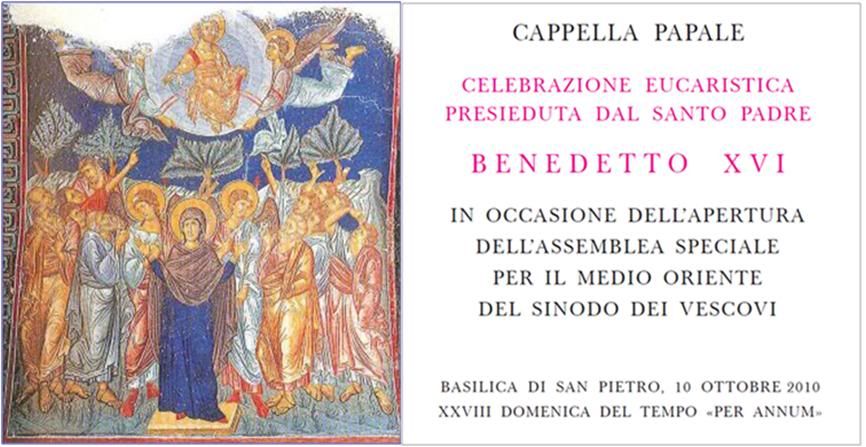
 Synodal focus is pastoral
Synodal focus is pastoral
not political, Pope says

10 OCT 2010 (RV) - Pope Benedict XVI says the reason for the special assembly of the Synod of Bishops for the Middle East, which opened Sunday, is pastoral and not political.
Speaking during Mass Sunday morning to the 270 participants at the assembly, which runs October 10th to 24th, the Pope underlined that “while not being able to ignore the delicate and at times dramatic social and political situation of some countries, the Pastors of the Middle Eastern Churches” during the three week meeting at the Vatican, “wish to concentrate on the aspects of their own mission”, in short “re-enliven communion of the Catholic Church in the Middle East”.
Sunday morning, to interchanging Arabic and Greek chants, those pastors processed down the nave of St Peter’s basilica, resplendent in their traditional liturgical vestments - a visible sign of what Pope Benedict XVI described as the “variety of liturgical, spiritual, cultural and disciplinary traditions” of the Eastern Churches in communion with Rome. Traditions, he said, that enrich the universal Church.
Joined by chief concelebrants Lebanese Card. Nasrallah Pierre Sfeir, Patriarch of Antioch of the Maronites, and Iraqi Card. Emmanuel III Delly, Patriarch of Babylon of the Chaldeans, the Pope told the assembly that this “singular event demonstrates the interest of the whole Church for that precious and beloved part of God’s people who live in the Holy Land and the whole of the Middle East”.
Reflecting on the theme of the Synod, “Communion and Witness”, Pope Benedict said “without communion there can be no witness”, reminding those present that communion is “a gift, not something which we ourselves must build through our own efforts”, a gift that requires conversion.
Referring to one of the principle concerns of many church leaders in the Middle East, the exodus of Christians from the cradle of the faith, Pope Benedict reminded all those present that “in Jerusalem the first Christians were few. Nobody could have imagined what was going to take place. And the Church continues to live on that same strength which enabled it to begin and to grow”, the strength of Pentecost.
“Therefore, the reason for this synodal assembly is mainly a pastoral one”, that, under the guidance of the Holy Spirit, the communion of the Catholic Church in the Middle East can be re-enlivened.
This he continued “requires the reinforcing of their Christian identity through the Word of God and the Sacraments” so that “the faithful feel the joy in living in the Holy Land”.
However, he added “living in a dignified manner in one’s own country is above all a fundamental human right: therefore, the conditions of peace and justice, which are necessary for the harmonious development of all those living in the region, should be promoted. Therefore all are called to give their personal contribution: the international community, by supporting a stable path, loyal and constructive, towards peace; those most prevalent religions in the region, in promoting the spiritual and cultural values that unite men and exclude any expression of violence”.
Concluding his homily the Holy Father extended his blessing on all the populations of the Middle East: ““Peace to you, peace to your family, peace to all that is yours!”.
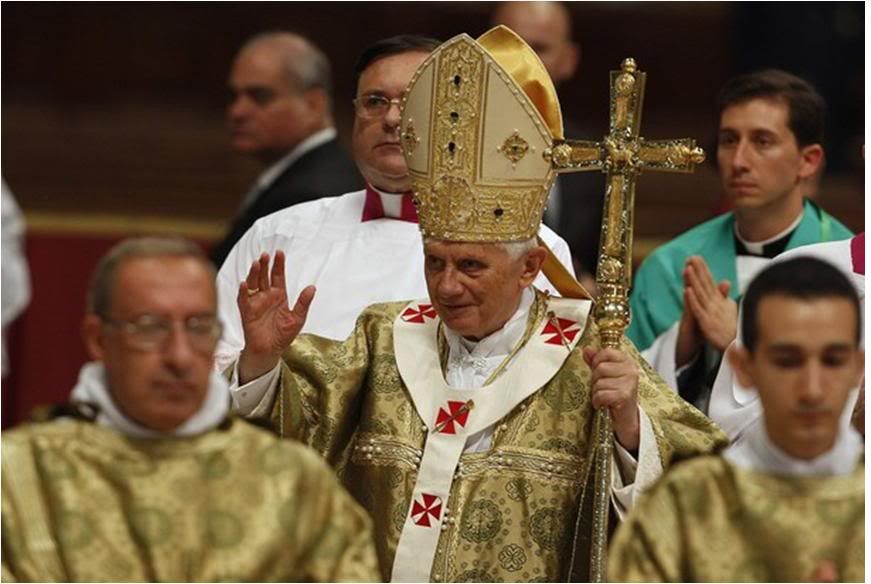
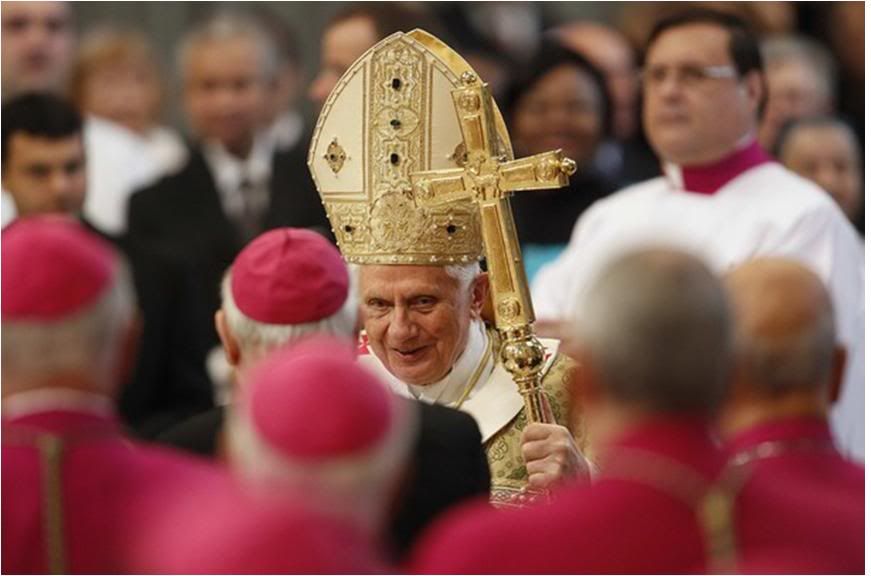
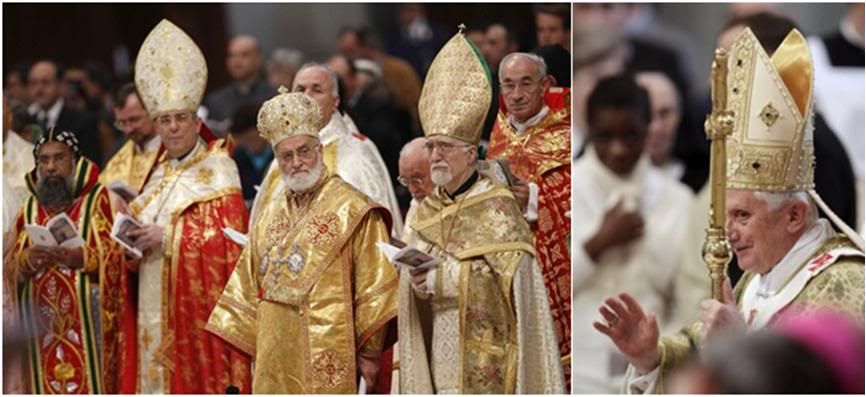
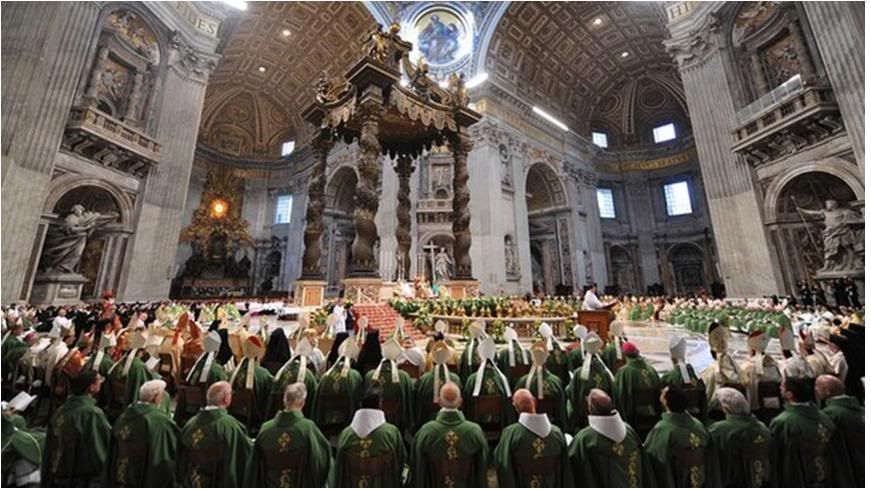
 The Latin patriarchate of Jerusalem, on its site, provides details about the Mass:
Inauguration of the Special
The Latin patriarchate of Jerusalem, on its site, provides details about the Mass:
Inauguration of the Special
Synodal Assembly for the Middle East

At 9.30 this morning, 10 October 2010, XXVIII Sunday in ordinary time, in St. Peter’s Basilica, at the tomb of the Apostle Peter, the Holy Father Benedict XVI presided at the Solemn Concelebration of the Eucharist with the Synodal Fathers, for the Inauguration of the Special Assembly for the Middle East of the Synod of Bishops, to be held in the Synod Hall of the Vatican until 24 October 2010, on the theme: The Catholic Church in the Middle East:Communion and Witness. "Now the company of those who believed were of one heart and soul" (Acts 4:32).
The entrance into the Basilica began at 9.15 with the singing of the Laudes regiae. The Concelebrants, led by the Masters of Ceremony took their places around the Altar of Confession. Then Their Eminences and the Components of the Presidency of the Special Assembly for the Middle East of the Synod of Bishops joined the Holy Father in the entrance procession.
Concelebrating with the Pope were 177 Synod Fathers (19 Cardinals, 9 Patriarchs, 72 Archbishops, 67 Bishops and 10 Priests) and 69 Collaborators.
At the start of the Concelebration, during the Rite of the Aspergillum presided over by the Holy Father, the choir and assembly sang “Asperges me”.
The Presidents-Delegate H. B. Card. Nasrallah Pierre SFEIR, Patriarch of Antioch of the Maronites, Bishop of Joubbé, Sarba and Jounieh of the Maronites (LEBANON), ad honorem, H. B. Card. Emmanuel III DELLY, Patriarch of Babylon of the Chaldeans (IRAQ) , ad honorem, H. Em. Card. Leonardo SANDRI, Prefect of the Congregation for the Oriental Churches (VATICAN CITY), H. B. Ignace Youssif III YOUNAN, Patriarch of Antioch of the Syrians (LEBANON); General Relator H. B. Antonios NAGUIB, Patriarch of Alexandria of the Copts (ARAB REPUBLIC OF EGYPT);General Secretary H. Exc. Mons. Nikola ETEROVIĆ, Titular Archbishop of Cibalae (VATICAN CITY); Special Secretary H. Exc. Mons. Joseph SOUEIF, Archbishop of Cyprus of the Maronites (CYPRUS) all joined the Pope at the Altar for the Eucharistic Prayer.
The first reading was in English, the responsorial Psalm in Italian and the second reading in French. The Gospel was proclaimed in Latin and in Greek. The Prayer of the Faithful was in English, Arabic, Turkish, Hebrew, Farsi. The songs “Ubi Caritas”, in Latin, and “Bread of Life”, in Arabic, accompanied the Offertory; “Beati Pacifici”, in Latin, and “My Soul Thirsts for You”, in Arabic, accompanied Communion. At the end of the celebration, the Marian antiphon “Ave Regina Caelorum” was sung.
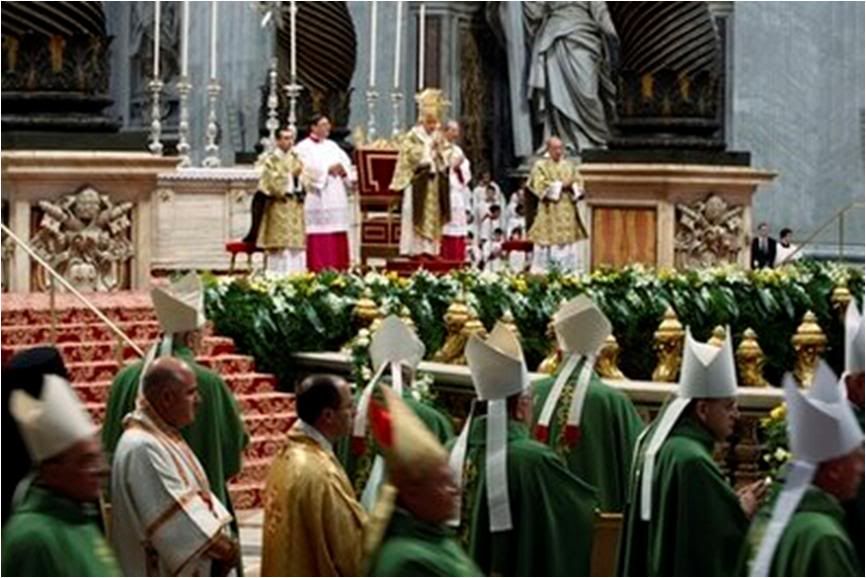
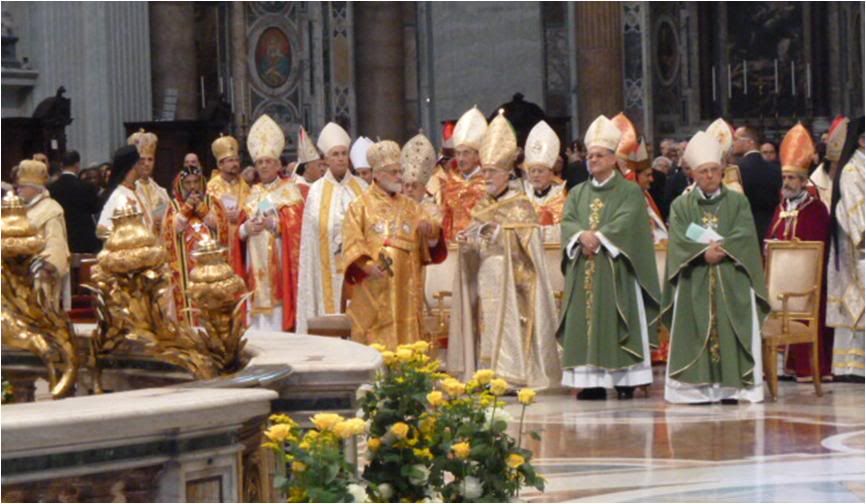
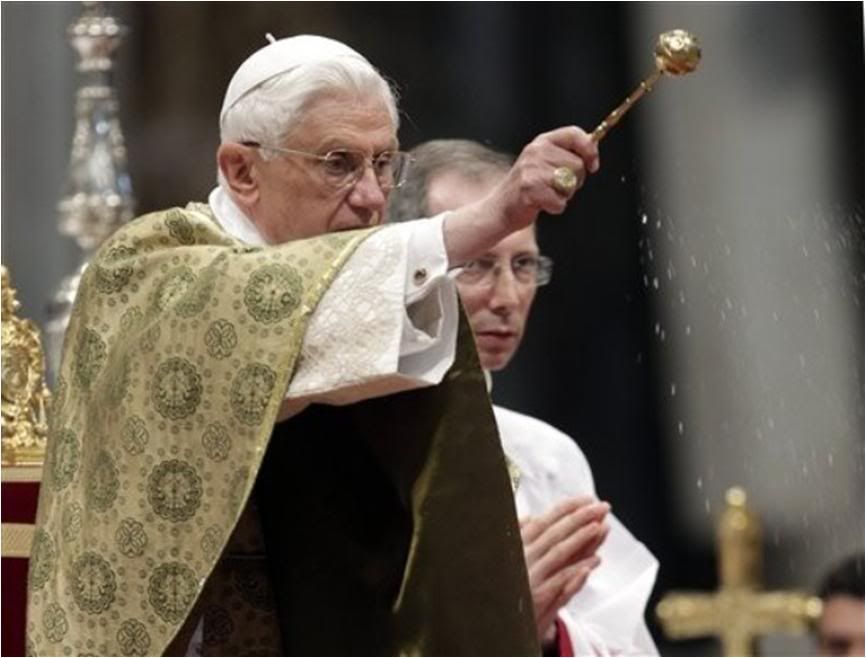
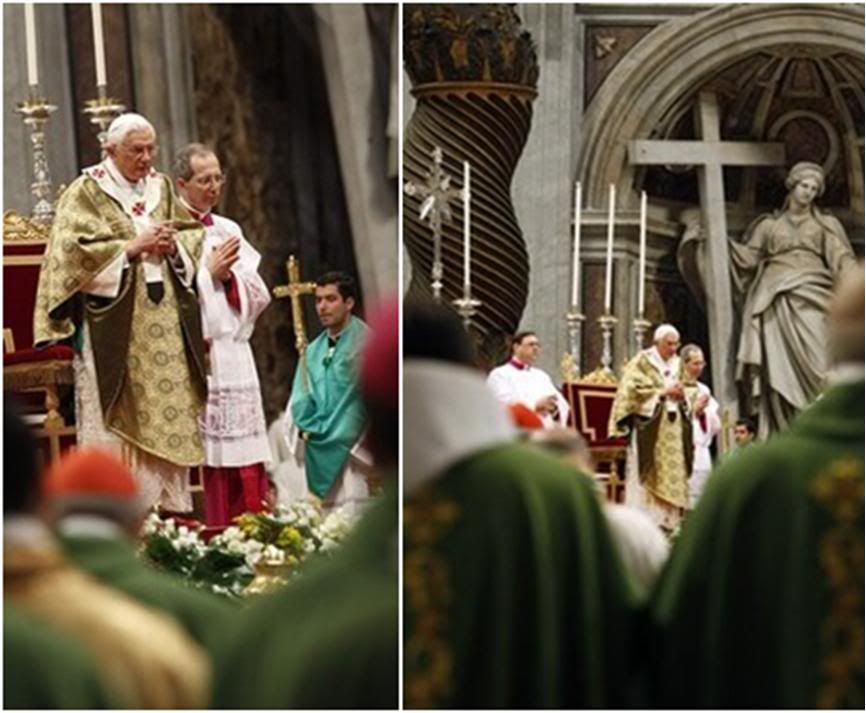
Here is a full translation of the Holy Father's homily:
Venerated Brothers,
Distinguished ladies and gentlemen,
dear brothers and sisters:
The Eucharistic Celebration, which is the act of thanksgiving to God par excellence, is distinguished for us today, gathered at the Tomb of St. Peter, by an extraordinary reason: the grace of seeing the Bishops of the Middle East united for the first time in a Synodal Assembly around the Bishop of Rome and Universal Pastor.
This singular event demonstrates the interest of the entire Church for that precious and beloved portion of the People of God who live in the Holy Land and in all of the Middle East.
Above all, we raise our thanks to the Lord of history, because he has allowed that, notwithstanding events that have often been difficult and agonizing, the Middle East has always seen, from the time of Jesus to our day, the continuity of the Christian presence.
In those lands, the one Church of Christ expresses itself in the variety of liturgical, spiritual, cultural and disciplinary traditions of the six venerable Oriental Catholic Churches sui iuris [in law, 'capable of managing one own affairs'], as well as in the Latin tradition.
The fraternal greeting which I address with great affection to the Patriarchs of each Church also extends to all the faithful entrusted to their pastoral care in their respective countries as well as in the diaspora.
On this 28th Sunday in ordinary time, the Word of God offers a theme for meditation which fits appropriately alongside the synodal event that we inaugurate today.
The reading from the Gospel of Luke brings us to the episode of the healing of ten lepers, of whom only one, a Samaritan, went back to thank Jesus.
In connection with this text, the first Reading, taken from the second Book of Kings, recounts the healing of Naaman, head of the Aramaic army, who was also leprous, and who was healed after immersing himself seven times into the waters of the river Jordan, following the order of the prophet Elijah. Naaman too went back to the prophet, and recognizing him as God's mediator, professed his faith in the one Lord.
Therefore, two leprous men, both non-Jews, are healed because they believed in the word of God's messenger. They are healed in the body, but they were also opened up to faith, and this heals them in the spirit - that means, it saves them.
The responsorial psalm sings of this reality: "The LORD has made his victory known;/ has revealed his triumph for the nations to see,/Has remembered faithful love toward the house of Israel" (Ps 98,2-3).
Thus, the theme: Salvation is universal. But it goes through a determined historical mediation : through the people of Israel, which becomes the people of Jesus Christ and of the Church.
The gate of life is open to all, but it is precisely that, a gate - which means, a passageway that is defined and necessary. This is stated synthetically by the Pauline formula that we heard in the Second Letter to Timothy: "the salvation which is in Jesus Christ' (2 Tm 2,10).
This is the mystery of the universality of salvation and at the same time, of its necessary link to the historical mediation of Jesus Christ, preceded by that of the people of Israel and prolonged by that of the Church.
God is love, and wishes that all men should take part in his life. In order to realize this plan, He who is One and Triune, created in the world a mystery of human and divine communion, historical and transcendent.
He creates it by the 'method', so to speak, of an alliance, linking himeelf with faithful and inexhaustible love to men, making them into a holy people who become a blessing for all the families on earth (cfr Gen 12,3).
Thus he reveals himself as the God of Abraham, of Isaac and of Jacob (cfr Ex 3,6), who leads his people to the 'land' of freedom and peace.
This 'land' is not of this earth. All of divine design transcends history, but the Lord wished to construct history with men, for men and in men, within the coordinates of space and time in which they live, and which he himself has given.
Part of these coordinates, with its specificity, is that which we call the Middle East. God sees this part of the world from a different perspective - one might say, from 'on high'. It is the land of Abraham, of Isaac, of Jacob; the land of the exodus and of the return from exile; the land of the Temple and the prophets; the land in which his only-begotten Son was born to Mary; where he lived, died and resurrected; the cradle of the Church, which was constituted to carry the Gospel of Christ to the very ends of the earth.
We too, as believers, look to the Middle East with this perspective, in the context of the history of salvation.
It is the interior perspective which guided me during my apostolic trips to Turkey, in the Holy Land - Jordan, Israel, Palestine - and to Cyprus, places where I was able to experience up close the joys and the concerns of their Christian communities.
Because of this, I gladly welcomed the proposal of the Patriarchs and Bishops of the region to call a synodal assembly in order for us to reflect together, in the light of Sacred Scripture and the Tradition of the Church, on the present and the future of the faithful and the peoples of the Middle East.
To look at that part of the world from the perspective of God means seeing in her the 'cradle' of his universal design for salvation in love, a mystery of communion which becomes real in freedom, and therefore deamnds a response from men.
Abraham, the prophets, the Virgin Mary are the protagonists of this response, which nonetheless is fulfilled in Jesus Christ, son of that land, but one descended from heaven.
From him, from his heart and his Spirit, the Church was born, a pilgrim on this earth to which she belongs. The Church was constituted in order to be, among men, the sign and instrument of the one universal salvific project of God.
She carries out this mission by being herself, namely 'communion and witness', as the theme for this Synodal assembly says, which refers to the famous definition by Luke of the first Christian community: "The community of believers was of one heart and mind" (Acts 4,32).
Without communion, there can be no witness: the best testimony is precisely a life of communion. Jesus says so, clearly: "This is how all will know that you are my disciples, if you have love for one another" (Jn 13,35).
This communion is the life of God himself which is communicated in the Holy Spirit through Jesus Christ. Thus it is a gift, not something that we can construct with our own powers. It is because of this that it concerns our freedom and awaits our response: communion always asks for conversion first, as a gift that must increasingly be better accepted and realized.
The first Christians in Jerusalem were few. No one could have imagined what would happen afterwards. The Church always lives from that same strength with which it was launched and through which it grew.
Pentecost was the original event for the Church but it is also a permanent dynamism. The Bishops' Synod is a privileged moment when we can renew the grace of Pentecost in the journey of the Church, so that the Good News can be announced with frankness and can be listened to by all the peoples.
That is why the purpose of this synodal meeting is predominantly pastoral. Although we cannot ignore the delicate and often tragic social and political situation of some countries, the pastors of the Churches in the Middle East wich to concentrate on the aspects that are their own mission.
In this respect, the Instrumentum laboris, elaborated by a pre-Synodal Council, whose members I sincerely thank for the work they did, underscored this ecclesial objective of the assembly, underscoring that it intends, under the guidance of the Holy Spirit, to revive the communion of the Catholic Church in the Middle East.
First of all, within each Church, among all its members: Patriarch, bishops, priests, religious, consecrated persons, and lay faithful. And then, in ther relationships with other Churches.
Church life, thus corroborated, will develop into fruits that are positive for the ecumenical journey with other Churches and ecclesial communities present in the Middle East.
This occasion is also propitious for constructive continuation of our dialog with the Jews, to whom we are indissolubly linked by the long story of the Covenant with God; as well as dialog with the Muslims.
The work of the Synodal assembly will also be oriented to the testimony of Christians on the personal, familial and community levels. This requires them to reinforce their Christian identity through the Word of God and the Sacraments.
We all wish that the faithful may feel the joy of living in the Holy Land, land that was blessed by the presence of Jesus Christ and his glorious Paschal mystery.
Over the centuries, those places have attracted multitudes of pilgrims, as well as communities of male and female religious orders who have considered it a great privilege to be able to live and bear witness in the land of Jesus.
Despite the difficulties, the Christians in the Holy Land are called on to revive their awareness of being the living stones of the Church in the Middle East, living in the places sacred to our salvation.
But to live with dignity in one's own land is above all a fundamental human right. Therefore, it is necessary to promote conditions of peace and justice, which are indispensable for the harmonious development of all the inhabitants of the region.
Everyone is called upon to make his own contribution: The international community, by sustaining a reliable, loyal and constructive path to peace; the religions who have a major presence in the region, by promoting spiritual and cultural values that unite men and exclude every expression of violence.
Christians will continue to give their contribution, not only through works of social promotion, such as educational and health care institutions, but above, all with the spirit of the evangelical beatitudes, which inspire the practice of forgiveness and reconciliation.
In this commitment, they will always have the support of the entire Church, as solemnly attested by the presence here of delegates from the episcopates of other continents.
Dear friends, let us entrust the work of the Synodal assembly for the Middle East to the numerous saints of that blessed land. Let us invoker the constant protection of the Blessed Virgin Mary, so that the ensuing days of prayer, reflection and fraternal communion may bear good fruits for the present and the future of the beloved peoples of the Middle East.
To these peoples, we address with all our heart the Biblical greeting: "Peace be with you, my brother, and with your family, and with all who belong to you" (1Sam 25,6).
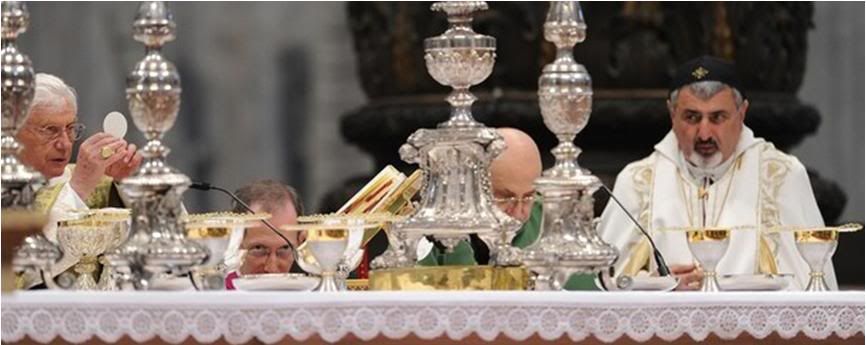
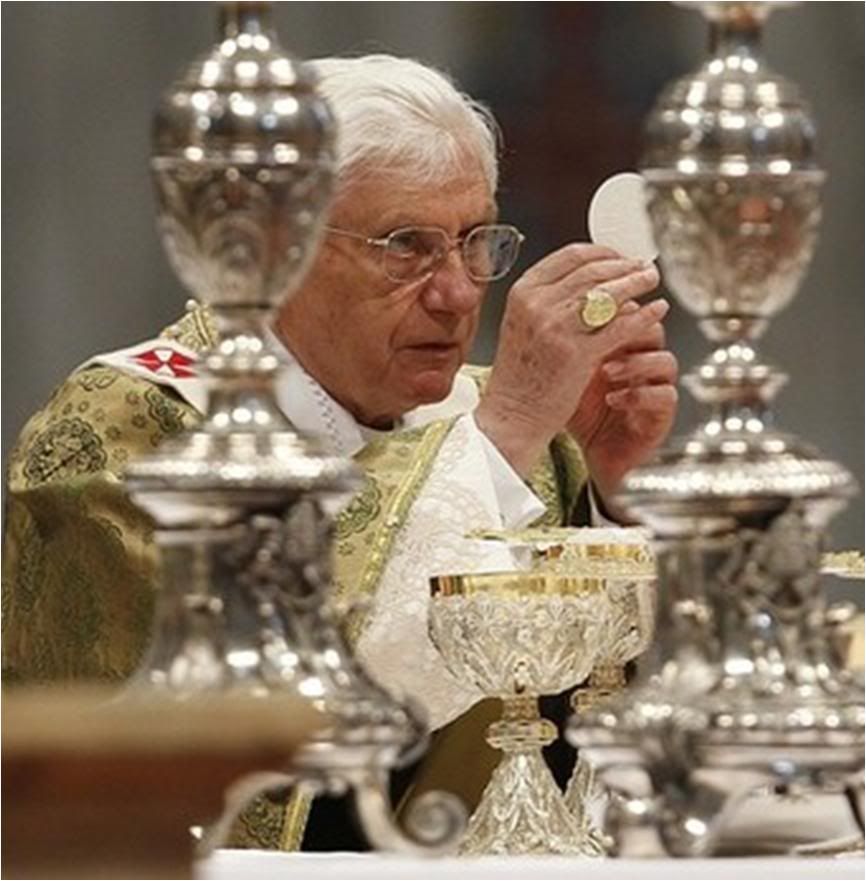
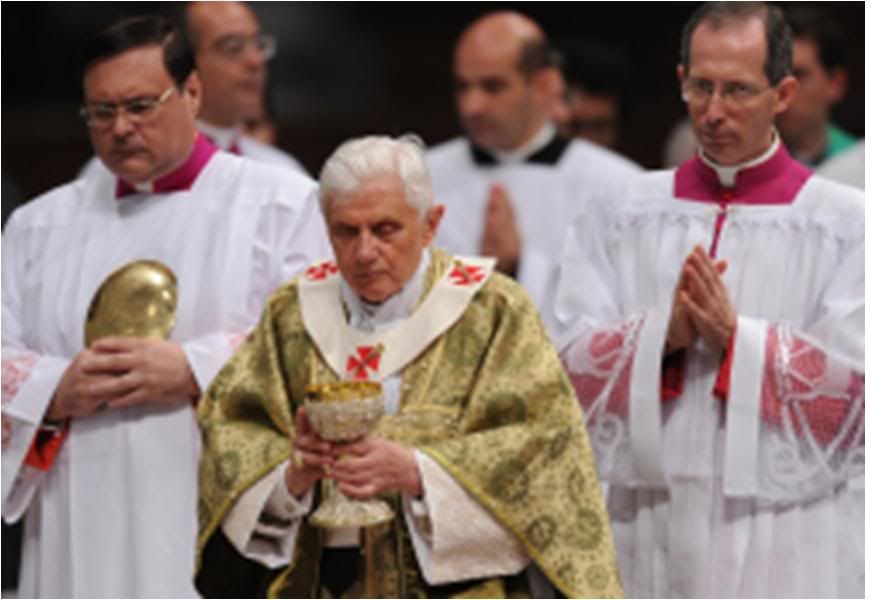
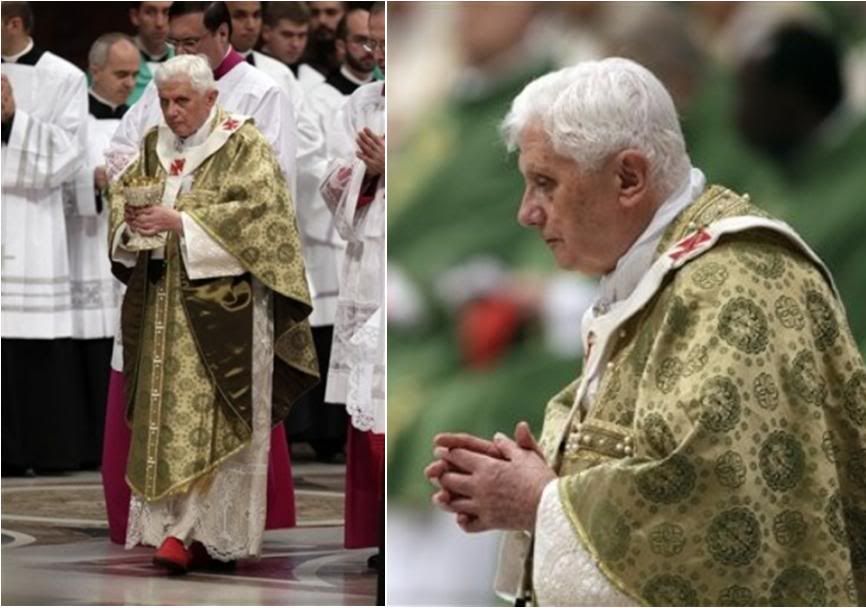
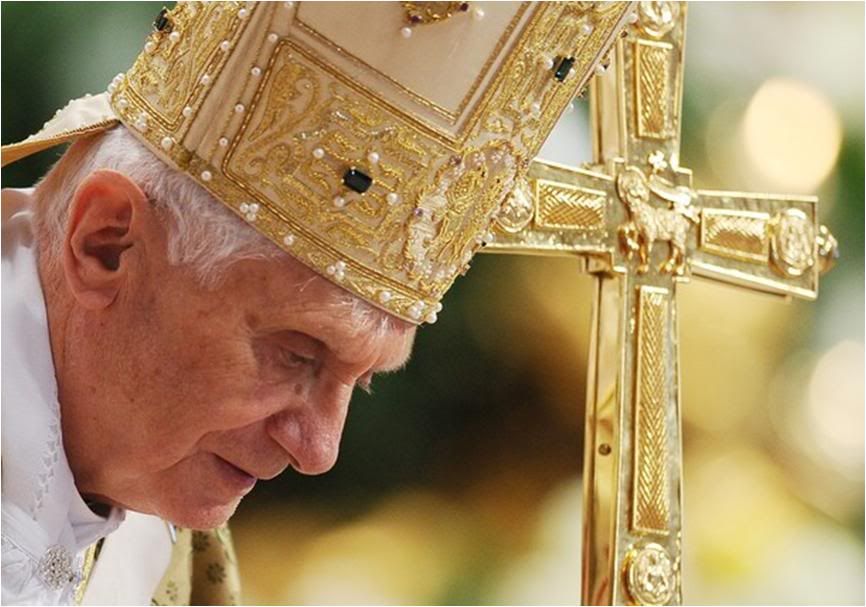
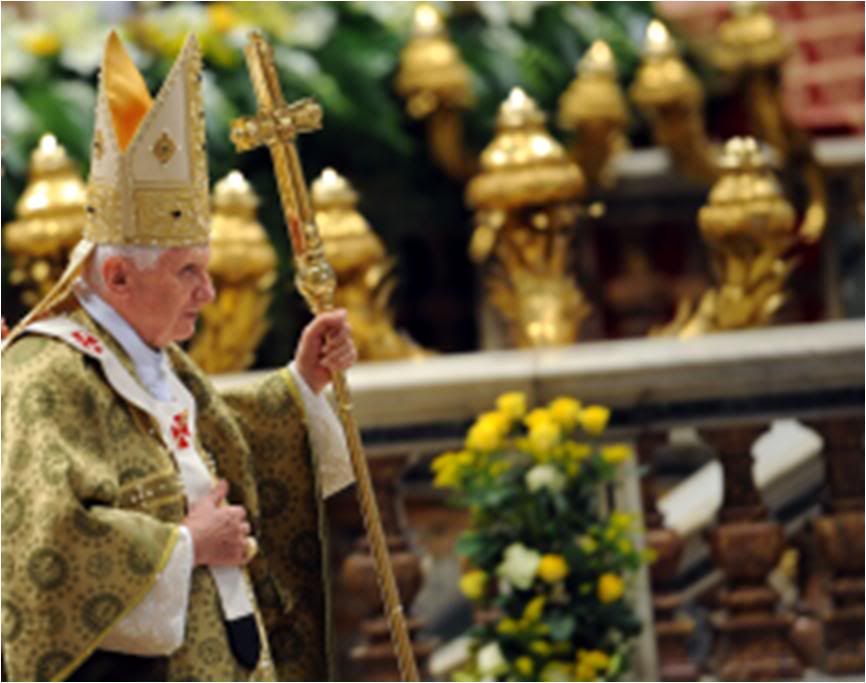 Pope calls for Mideast peace
Pope calls for Mideast peace

VATICAN CITY, Oct. 10 (AFP) – Christianity, Islam and Judaism should work for Middle East peace, Pope Benedict XVI said on Sunday, opening a Vatican conference set to include senior Muslim and Jewish leaders for the first time.
The three main religions in the Middle East should "promote spiritual and cultural values that unite people and exclude any form of violence," Benedict said at a mass to mark the start of the special synod of Catholic bishops.
The international community should support "a trustworthy, loyal and constructive path towards peace" in the region, he said in his sermon.
"This is also a good occasion to continue our constructive dialogue with the Jews... as well as with the Muslims," the pope added.
The special synodal assembly has been called mainly to discuss pastoral issues linked to the dwindling Christian communities in the Middle East, but also aims to foster peace between Israel and the Palestinians and to counter Islamic extremism.
"The vital dialogue with Judaism is one of the main objectives of the synod, along with the difficult but necessary dialogue with Islam," Nikola Eterovic, the archbishop in charge of organising synods, said earlier.
He added that Arab Christian communities were "a natural bridge with Islam."
Referring to the Middle East conflict, he said: "We hope we will be able to achieve peace and that the synod marks a step forward in this direction."
Arabic will be one of the official languages at the synod, which will bring together Catholic clergymen, an Iranian ayatollah and a senior rabbi.
The Muslim and Jewish leaders will however address the synod separately and will not meet, organisers said.
The synod talks are set to get under way on Monday and the conference runs for two weeks until October 24.
"We want maximum visibility for the Catholic church in this region, which is so vital to Christian history and which has been hit by tensions, conflicts, religious and political upheaval in the past 2,000 years," Eterovic said.
He said that the "difficult conditions" faced by Christians in the region because of discrimination and violence had forced many to emigrate.
There are around 20 million Christians in the Middle East including five million Catholics in a population of around 356 million people.
A preparatory document for the synod singled out problems of violence and discrimination faced by Christians in Iraq, Egypt and Turkey.
[Modificato da TERESA BENEDETTA 11/10/2010 14:20]